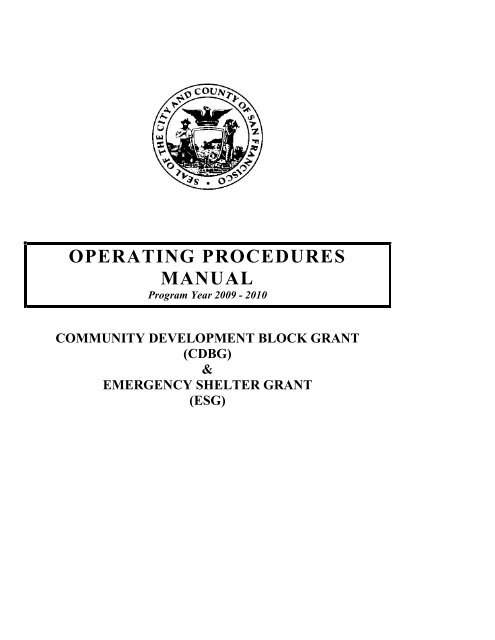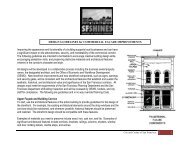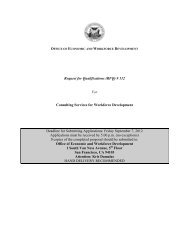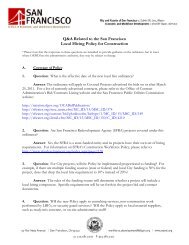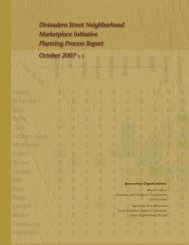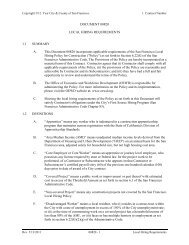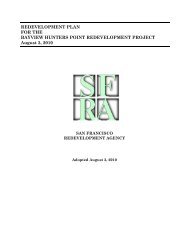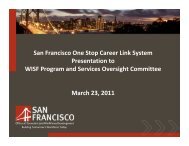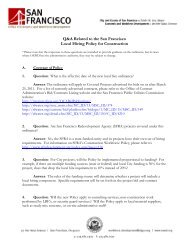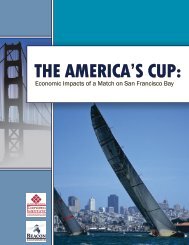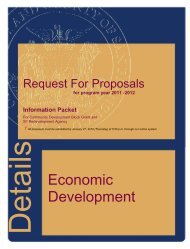2009-10 Operating Manual - Office of Economic and Workforce ...
2009-10 Operating Manual - Office of Economic and Workforce ...
2009-10 Operating Manual - Office of Economic and Workforce ...
- No tags were found...
You also want an ePaper? Increase the reach of your titles
YUMPU automatically turns print PDFs into web optimized ePapers that Google loves.
OPERATING PROCEDURESMANUALProgram Year <strong>2009</strong> - 20<strong>10</strong>COMMUNITY DEVELOPMENT BLOCK GRANT(CDBG)&EMERGENCY SHELTER GRANT(ESG)
TABLE OF CONTENTSI. Introduction…………………………………………………….……………………………1II. Program Management………………………………………………………….…………...3A. Work PlanB. Program BudgetIII. Internal Controls for Accounting <strong>and</strong> Record Keeping…………………...………………<strong>10</strong>A. Client/Program <strong>and</strong> Financial RecordsB. Client/Program Records OverviewC. Financial Records OverviewD. Cash DisbursementsE. Accounts PayableF. Petty CashG. Cash ReceiptsH. PayrollI. Inventory <strong>of</strong> Fixed AssetsIV. Procurement <strong>and</strong> Contractual Services…………………………………….…………….13A. OverviewB. Required Subcontracting ProvisionsC. Federal Prevailing Wages in Construction Contracts (Davis-Bacon)V. Monitoring……………………………………..……………………………………….…15A. ReportsB. Review/Site VisitsC. Joint Accountability St<strong>and</strong>ardsVI. General Administrative Procedures………………………………………………………18A. Equal Employment OpportunityB. Employment Policies <strong>and</strong> ProceduresC. Board <strong>of</strong> DirectorsD. Sunshine OrdinanceE. First Source HiringF. Section 3 ComplianceG. Americans with Disabilities Act (ADA)H. Environmental ReviewI. Statement <strong>of</strong> <strong>Economic</strong> InterestJ. Care to ChildrenFormatted: Bullets <strong>and</strong> NumberingVII. Appendix 1………………………………………………………………………………22<strong>2009</strong>-<strong>10</strong> Program Year
CHAPTER I. INTRODUCTIONThe mission <strong>of</strong> the Mayor’s <strong>Office</strong> <strong>of</strong> Housing (MOH) is to provide financing for thedevelopment, rehabilitation <strong>and</strong> purchase <strong>of</strong> affordable housing in San Francisco. MOH guides<strong>and</strong> coordinates the City’s housing policy <strong>and</strong> administers a variety <strong>of</strong> programs to finance thedevelopment <strong>of</strong> affordable housing by non-pr<strong>of</strong>it <strong>and</strong> for pr<strong>of</strong>it developers, provide financial <strong>and</strong>educational assistance to first-time homebuyers, <strong>and</strong> finance housing rehabilitation costs for lowincomehomeowners. Within MOH, the mission <strong>of</strong> its Community Development Division is topartner with the community to strengthen the social, physical <strong>and</strong> economic infrastructure <strong>of</strong> SanFrancisco's low-income neighborhoods <strong>and</strong> communities in need.MOH has been designated as the city agency to administer the U.S. Department <strong>of</strong> Housing <strong>and</strong>Urban Development’s (HUD) Community Development Block Grant (CDBG) program <strong>and</strong>Emergency Shelter Grant (ESG) program. The CDBG <strong>and</strong> ESG programs provide uniquelyflexible resources for community development. Each year, CDBG <strong>and</strong> ESG funds help build <strong>and</strong>strengthen our community, particularly those neighborhoods with a high number <strong>of</strong> residentsliving in poverty. The intent <strong>of</strong> the CDBG program is to support efforts that improve the quality<strong>of</strong> life for low <strong>and</strong> moderate-income persons. The intent <strong>of</strong> the ESG program is to supportefforts that provide services to persons who are homeless or programs that preventhomelessness. The <strong>Office</strong> <strong>of</strong> <strong>Economic</strong> <strong>and</strong> <strong>Workforce</strong> Development (OEWD) has beendesignated to administer the CDBG programs in the areas <strong>of</strong> economic development <strong>and</strong>workforce development.This manual applies to all ESG grants <strong>and</strong> CDBG grants in the areas <strong>of</strong> Public Services,<strong>Workforce</strong> Development, <strong>Economic</strong> Development, Planning, Housing <strong>and</strong> Emergency Shelter.CDBG Capital <strong>and</strong> Public Space Improvement grantees should refer to the MOH CapitalImplementation <strong>Manual</strong>. This manual provides guidance on program <strong>and</strong> budget management,contract negotiations, requirements for financial controls, procurement <strong>of</strong> contractual services,monitoring <strong>and</strong> general administrative procedures. This manual is intended as a general guide<strong>and</strong> does not replace or amend any <strong>of</strong> the provisions <strong>of</strong> the Grant Agreement.Non-pr<strong>of</strong>it organizations receiving grant awards from MOH <strong>and</strong> OEWD are required to establish<strong>and</strong> maintain internal controls designed to ensure compliance with federal (including HUD),state <strong>and</strong> local laws, regulations <strong>and</strong> program requirements. This manual provides generalinformation on procedures as well as the minimum requirements for establishing internalfinancial <strong>and</strong> program controls to effectively operate <strong>and</strong> manage program activities. Granteesshould review the full Grant Agreement <strong>and</strong> consult with the assigned MOH or OEWD GrantCoordinator if they have any questions or concerns about anything related to their CDBG/ESGgrant. If grantees have any questions <strong>of</strong> a legal nature, they should consult their attorney.<strong>2009</strong>-<strong>10</strong> Program Year 1
The U.S. <strong>Office</strong> <strong>of</strong> Management <strong>and</strong> Budget (OMB) requires agencies that receive federal fundsto comply with:• OMB Circular A-1<strong>10</strong> Uniform Administrative Requirements for Grants <strong>and</strong> CooperativeAgreements with Institutions <strong>of</strong> Higher Education, Hospitals <strong>and</strong> Other Non-Pr<strong>of</strong>itOrganizations;• OMB Circular A-122 Cost Principles for Non-Pr<strong>of</strong>it Organizations; <strong>and</strong>• OMB Circular A-133 Audits <strong>of</strong> Institutions <strong>of</strong> Higher Education <strong>and</strong> Other Non-Pr<strong>of</strong>itOrganizations.In addition to these three OMB Circular regulations, all grantees are required to comply with avariety <strong>of</strong> regulations <strong>and</strong> policies detailed in the Grant Agreement between the City <strong>and</strong> County<strong>of</strong> San Francisco <strong>and</strong> the non-pr<strong>of</strong>it organization. Each grantee must be an approved vendor <strong>of</strong>the City <strong>and</strong> County. If the non-pr<strong>of</strong>it organization is a new grantee with the City, theorganization must fill out the forms required by the <strong>Office</strong> <strong>of</strong> Contract Administration. Theapplication form to be a City vendor <strong>and</strong> other required forms are available athttp://www.sfgov.org/site/oca_page.asp?id=26550.Chapter 12B <strong>of</strong> the San Francisco Administrative Code requires organizations doing businesswith the City <strong>and</strong> County to agree not to discriminate against any specified groups for specifiedreasons. Please review http://www.sfgov.org/site/sfhumanrights_page.asp?id=5921 for moreinformation. If organizations cannot fulfill all the requirements <strong>of</strong> Chapter 12B, the City’sability to enter into a Grant Agreement is significantly limited. Chapter 12B is enforced by theCity’s Human Rights Commission. If a nonpr<strong>of</strong>it organization has not yet been certified as beingin compliance with 12B, they should contact the Human Rights Commission at (415) 252-2500<strong>and</strong> follow their guidelines for certification. Application forms can be downloaded fromhttp://www.sfgov.org/site/uploadedfiles/sfhumanrights/forms/12b<strong>10</strong>1.pdf.<strong>2009</strong>-<strong>10</strong> Program Year 2
CHAPTER II. PROGRAM MANAGEMENTCDBG <strong>and</strong> ESG grants from MOH <strong>and</strong> OEWD are for the specific purpose <strong>of</strong> funding programs<strong>and</strong> capital projects that will provide services to low <strong>and</strong> moderate-income residents <strong>of</strong> SanFrancisco. All MOH/OEWD funded employees <strong>of</strong> the grantees must be trained on therequirements detailed in this manual.Upon recommendation for funding, grantees will negotiate with MOH or OEWD on the workplan <strong>and</strong> budget for the upcoming program year. This negotiation process will be done via theGreen Light online system (www.sfgov.org/mocd). New grantees will learn how to access theGreen Light system at the orientation <strong>and</strong> will be provided a User ID <strong>and</strong> password. Once MOHor OEWD approves the work plan <strong>and</strong> budget, grantees will enter into a Grant Agreement todeliver the agreed upon programs <strong>and</strong> services. The negotiated work plan <strong>and</strong> budget will then bereflected on the 7c2 online reporting system (www.sfgov.org/mocd). Grantees will report toMOH <strong>and</strong> OEWD on a monthly basis through 7c2, unless as otherwise described in this manual.Specific program areas may have additional reporting requirements as m<strong>and</strong>ated by MOH orOEWD that may include the tracking <strong>of</strong> additional data separately from the 7c2 database.A. Work Plan1. Work Plan DefinitionThe work plan is an outline <strong>of</strong> the major components <strong>of</strong> a program to support successful delivery<strong>of</strong> services to individuals. It details projected activities <strong>and</strong> services <strong>of</strong> the program, the annualoutput for each activity <strong>and</strong> the number <strong>of</strong> unduplicated clients per neighborhood. Granteeselaborate on their program staffing <strong>and</strong> evaluation methods through the work plan narrative.2. Activities <strong>and</strong> ServicesThe work plan is made up <strong>of</strong> two programmatic elements: activities <strong>and</strong> services. Activities aredefined as the primary building blocks to achieve the desired overall goals <strong>of</strong> the fundedprogram. Services are more specific elements within each activity. Each activity <strong>and</strong> eachservice should have a brief one or two line description written by the agency. All activities willbe composed <strong>of</strong> one or more services to achieve their goals. For example, an activity may be“Job Readiness- S<strong>of</strong>t Skill Training” <strong>and</strong> the corresponding services might include “Classes <strong>and</strong>Workshops” <strong>and</strong> “Employment Counseling – Individual.”3. Annual OutputAnnual output is the number <strong>of</strong> unduplicated clients served or other units <strong>of</strong> service (e.g. number<strong>of</strong> workshops) completed by each activity. If an activity consists <strong>of</strong> more than one service,clients may be duplicated between services, but each activity should show the overallunduplicated number <strong>of</strong> clients served.<strong>2009</strong>-<strong>10</strong> Program Year 3
The Neighborhood section <strong>of</strong> the work plan should also have a single figure reflecting the totalnumber <strong>of</strong> unduplicated clients served by the program as a whole. For Public Services,<strong>Workforce</strong> Development, <strong>and</strong> Emergency Shelter Grants, annual output should be the number <strong>of</strong>individuals served. For <strong>Economic</strong> Development contracts, output will not only be the number <strong>of</strong>individuals served but also the number <strong>of</strong> businesses assisted, the number <strong>of</strong> jobs created <strong>and</strong>other measures that will be negotiated between the organization <strong>and</strong> the MOH/OEWDrepresentative. For the Housing program grants, such as homeownership or tenant counseling,the annual output should be the number <strong>of</strong> individuals served. Planning <strong>and</strong> Capacity Buildinggrants do not have to enter a total number <strong>of</strong> unduplicated clients but will present a final reportoutlining the outcomes <strong>of</strong> the planning process or capacity building efforts.4. Deviation from Work Plan <strong>and</strong> Program ProgressMOH/OEWD <strong>and</strong> the San Francisco Board <strong>of</strong> Supervisors approve grants for a specific program<strong>and</strong> purpose. In most cases, that program <strong>and</strong> purpose cannot be renegotiated <strong>and</strong> the grant mustbe implemented or the funding returned. On occasion, <strong>and</strong> as a result <strong>of</strong> following the negotiatedwork plan, it may become apparent that different/more effective/efficient activities can beengaged in to achieve the negotiated outcomes. Work plans can only be renegotiated with theconsent <strong>of</strong> MOH/OEWD. Any deviation from the work plan can result in non-reimbursementfor unapproved activities <strong>and</strong>/or cancellation <strong>of</strong> the Grant Agreement. Contact the assignedGrant Coordinator for any questions.Program progress according to the work plan is reviewed by the Grant Coordinator on a regularbasis depending on the review schedule established at the beginning <strong>of</strong> the grant. Insufficientprogress or delays in the program may jeopardize the grant <strong>and</strong>/or reimbursements. (See alsoChapter II B (2): Reimbursement <strong>of</strong> Expenses <strong>and</strong> Chapter V: Monitoring).5. Nondiscrimination in Provision <strong>of</strong> ServicesAll MOH/OEWD funded agencies must ensure that all persons have equal opportunity <strong>and</strong>access to services, pursuant to federal requirements including Title VI, 24 C.F.R. 1.4(b)(2)(i).MOH/OEWD’s Grant Agreement with each agency states in section 11.02, “ Covenant Not toDiscriminate,” that “In the performance <strong>of</strong> this Agreement, the Corporation covenants <strong>and</strong>agrees not to discriminate on the basis <strong>of</strong> the fact or perception <strong>of</strong> a person's race, color, creed,religion, national origin, ancestry, age, sex, sexual orientation, gender identity, domestic partnerstatus, marital status, disability, weight, height or Acquired Immune Deficiency Syndrome orHIV status (AIDS/HIV status) against any employee or any City employee working with orapplicant for employment with the Corporation, in any <strong>of</strong> the Corporation's operations within theUnited States, or against any person seeking accommodations, advantages, facilities, privileges,services, or membership in all business, social, or other establishments or organizations operatedby the Corporation.”If a subrecipient is serving one race or ethnic group exclusively or almost exclusively,MOH/OEWD will require a justifiable rationale for such exclusivity. An example <strong>of</strong> a justifiablerationale might be a program targeting monolingual immigrants, wherein the language in whichthe program is <strong>of</strong>fered is closely linked to the racial/ethnic makeup <strong>of</strong> the clientele. In thosecases in which MOH/OEWD is unable to determine a justifiable rationale, funded agencies or<strong>2009</strong>-<strong>10</strong> Program Year 4
subrecipients will be required to create an approved outreach plan to publicize their services tounderrepresented populations. Such an outreach plan might include the distribution <strong>of</strong> fliers toother organizations <strong>and</strong> communities that are specifically absent from the subrecipient’s currentclient population; subrecipient outreach at community events that target underrepresentedpopulations; electronic distribution <strong>of</strong> materials to other MOH or OEWD-funded subrecipientsthat target diverse constituencies; <strong>and</strong>/or listing <strong>of</strong> programs being <strong>of</strong>fered by the subrecipient incommunity newspapers, newsletters or other community listings.B. Program Budget1. Definitions <strong>and</strong> Eligible/Ineligible CostsThe Program Budget is the projected expenditure schedule for the term <strong>of</strong> the Grant Agreement.The annual program budget will be approved by MOH/OEWD during the grant negotiationprocess. Grant Agreements cannot be effectuated or implemented without an approved budget.Requests for budget revisions should be submitted using the st<strong>and</strong>ardized Budget Revision formwhich can be found on the MOH website. This form is designed to provide line item detail forCDBG/ESG funded projects by cost categories.Program <strong>and</strong> Organization StaffingProgram staffing is negotiated at the beginning <strong>of</strong> the program year <strong>and</strong> is designed to ensureadequate <strong>and</strong> appropriate staffing for provision <strong>of</strong> services <strong>and</strong>/or successful completion <strong>of</strong>program activities <strong>and</strong> achievement <strong>of</strong> program outcomes. Grantees must notify their GrantCoordinator as soon as possible <strong>and</strong> no later than 15 days regarding any staffing changes if thesechanges impact the provision <strong>of</strong> services. The grantee’s Board President or Secretary mustnotify MOH/OEWD in writing within 15 days should there be a change in the status <strong>of</strong> theorganization’s Executive Director.Subcontracts; Equipment Purchase; Travel <strong>and</strong> Space RentalProgram budgets that include paying a vendor for contractual services or equipment purchaseshould refer to Chapter IV – Procurement <strong>and</strong> Contractual Services.Prior written MOH/OEWD approval is required for all general purpose equipment purchases <strong>of</strong>$1,000 or more (e.g. <strong>of</strong>fice equipment <strong>and</strong> furnishing, information technology equipment <strong>and</strong>systems, reproduction <strong>and</strong> printing equipment.) Prior written approval is also required forcontractual services (consultants, independents contractors, sub-contracts/3 rd party contracts) <strong>of</strong>$1,000 or more. Expenditures made prior to obtaining MOH/OEWD approval are ineligible forreimbursement. Prior approval can only be obtained by completing <strong>and</strong> submitting Form H:Request for Approval <strong>of</strong> Subcontract <strong>and</strong> Equipment Purchase.Contractual services <strong>and</strong> equipment purchases under $<strong>10</strong>00 do not require prior approval fromMOH/OEWD <strong>and</strong> do not require submission <strong>of</strong> a Form H.For out-<strong>of</strong>-city travel, grantees must submit a letter <strong>of</strong> request to their Grant Coordinator forapproval. If the organization will be using CDBG or ESG funds to pay for space rental, theymust submit a copy <strong>of</strong> the lease agreement to their assigned Grant Coordinator.<strong>2009</strong>-<strong>10</strong> Program Year 5
InsuranceCurrent insurance coverage is required prior to reimbursement for any expenditure. It is theresponsibility <strong>of</strong> the grantee to supply MOH <strong>and</strong> OEWD with current certificates <strong>of</strong> insurance.The minimum requirement for insurance coverage during the contract term includes:a. Workers’ Compensation insurance <strong>of</strong> statutory limits, including Employers’ Liabilitycoverage with limits not less than $1,000,000 each accident;b. Comprehensive General Liability insurance with limits not less than $1,000,000 eachoccurrence combined single limit for Bodily Injury <strong>and</strong> Property Damage, includingcoverage for Contractual Liability, Independent Contractors, Broad form PropertyDamage, Products <strong>and</strong> Completed Operations. The City <strong>and</strong> County <strong>of</strong> San Franciscomust be named as an additional insured in these policies, <strong>and</strong> this must be indicated onthe certificate;c. Comprehensive Automobile Liability insurance with limits not less than $1,000,000 eachoccurrence combined single limit for Bodily Injury <strong>and</strong> Property Damage, includingcoverage for owned, non-owned <strong>and</strong> hired vehicles. The City <strong>and</strong> County <strong>of</strong> SanFrancisco must be named as an additional insured in these policies, <strong>and</strong> this must beindicated on the certificate;d. Property insurance covering all real property constructed, improved or rehabilitated <strong>and</strong>all real <strong>and</strong> personal (non-expendable) property leased or purchased in whole or in partwith CDBG or ESG funds, in a form appropriate for the nature <strong>of</strong> such property, coveringall risks <strong>of</strong> loss, excluding earthquake <strong>and</strong> flood, for <strong>10</strong>0% <strong>of</strong> the reconstruction value(brought up to current codes), with deductible, if any, acceptable to the City, <strong>and</strong> namingthe City as loss payee, as its interest may appear, except that if the Corporation leases realproperty such coverage with respect to the leased property may be provided by the owneror l<strong>and</strong>lord;e. Pr<strong>of</strong>essional Liability (errors <strong>and</strong> omissions) insurance with limits not less that $750,000each occurrence, covering architectural, engineering, design, technical or pr<strong>of</strong>essionalservices, as appropriate, with respect to any subcontract for or any donation <strong>of</strong>pr<strong>of</strong>essional services, for the term <strong>of</strong> the applicable construction contract.Formatted: Bullets <strong>and</strong> NumberingIneligible CostsIneligible costs include, but are not limited to the following:a. Advertising not associated with personnel recruitment, procurement <strong>of</strong> goods <strong>and</strong>services, <strong>and</strong> disposal <strong>of</strong> surplus property;b. Costs incurred by advisory councils or committees unless specifically authorized byHUD;c. Costs <strong>of</strong> alcoholic beverages;d. Bad debts <strong>and</strong>/or any losses arising from un-collectible accounts;e. Contributions <strong>and</strong> donations, including cash, property <strong>and</strong> services made by organizationregardless <strong>of</strong> recipient;f. Donations to a contingency reserve or unforeseen events;<strong>2009</strong>-<strong>10</strong> Program Year 6
g. Costs <strong>of</strong> entertainment, including amusement, diversion, <strong>and</strong> social activities <strong>and</strong> anycosts directly associated with such costs (such as tickets to shows or sports events, meals,lodging, rentals, transportation, <strong>and</strong> gratuities);h. Costs <strong>of</strong> organized fundraising;i. Fines <strong>and</strong> penalties resulting from violations or failure to comply with laws <strong>and</strong>regulations;j. Membership expenses in lobbying organizations;k. Interest <strong>and</strong> other financial costs;l. Personal items;m. Legal fees;n. Costs associated with out-<strong>of</strong>-county air/ground travel, equipment <strong>and</strong> subcontracts thatwere incurred prior to obtaining written approval from MOH/OEWD; <strong>and</strong>o. Stipends or subsistence-type grant payments.For a complete description <strong>of</strong> eligible <strong>and</strong> ineligible costs, please see OMB Circular No. A-122.Matching Grants <strong>and</strong> In-Kind ContributionsMatching contributions can take the form <strong>of</strong> cash, non-cash equivalent services, equipment, orother non-expendable property. Cost principles for valuation <strong>of</strong> in-kind <strong>and</strong> other contributionsmust:a. Be verifiable records;b. Not be included as a contribution for any other federally-assisted program;c. Ensure value <strong>of</strong> services be consistent with those paid for similar work;d. Ensure value <strong>of</strong> property be at fair market value;e. Document volunteer services (names, addresses, dates <strong>and</strong> hours <strong>of</strong> work);f. Include basis for determining the value <strong>of</strong> personal services, material, equipment, l<strong>and</strong><strong>and</strong> other fixed assets.2. Reimbursement <strong>of</strong> ExpensesCDBG/ESG grants are awarded on a cost reimbursement system. Agencies must submit amonthly program <strong>and</strong> cost report through the 7c2 online system <strong>and</strong> MOH/OEWD willreimburse grantees for budgeted program expenses. Requests to submit reports on a bi-monthlyor quarterly schedule must be agreed to by the grant coordinator. Program <strong>and</strong> client data mustbe reported as a condition <strong>of</strong> reimbursement.Copies <strong>of</strong> the monthly payroll register <strong>and</strong> quarterly payroll tax report (DE6 <strong>and</strong> 941) must besubmitted by e-mail, fax or mail (postmarked by the 15 th <strong>of</strong> each month) to the GrantCoordinator at the time <strong>of</strong> submission <strong>of</strong> online reimbursement request. The payroll registermust identify MOH/OEWD funded employees. All confidential information on the payrollregister can be blocked out to ensure privacy. HUD has requested that agencies submit thisinformation since the salary line item constitutes the majority <strong>of</strong> the CDBG allocation to theagencies.The three-step process for reimbursement is as follows:<strong>2009</strong>-<strong>10</strong> Program Year 7
1) Grantee submits accurate <strong>and</strong> completed cost <strong>and</strong> program reports authorized by theExecutive Director to MOH/OEWD within 15 days <strong>of</strong> the close <strong>of</strong> the reporting month,2) MOH/OEWD reviews these documents for eligibility, appropriateness <strong>and</strong> compliance;3) City issues check. Checks will only be mailed to the <strong>of</strong>ficial address <strong>of</strong> the organization.MOH/OEWD strongly encourages electronic payments to be set up between the agency <strong>and</strong> theCity as this provides a much more efficient way <strong>of</strong> receiving payment. Instructions for setting upthis service can be found at http://www.sfgov.org/site/controller_index.asp?id=65752.Hard copies <strong>of</strong> supporting documents (including client records, invoices, delivery slips <strong>and</strong>photocopies <strong>of</strong> checks used for payments) must be kept at the agency.When necessary, MOH/OEWD will request additional information to confirm compliance withHUD regulations. Any questioned costs must be resolved within 90 days or it will be nullified<strong>and</strong> the questioned amount deducted from future payments. For a list <strong>of</strong> eligible <strong>and</strong> ineligibleexpenses pursuant to federal regulations, please see OMB Circular No. A-122.3. Cash AdvanceRequests for a cash advance must be submitted in writing <strong>and</strong> will be evaluated on a case-bycasebasis. MOH <strong>and</strong> OEWD do not encourage agencies to request cash advances. In certainlimited circumstances, such as when agencies are starting programs <strong>and</strong> must begin to recruitstaff members, purchase equipment or acquire materials, MOH/OEWD will consider cashadvance requests.After the Grant Agreement has been signed, MOH/OEWD may issue a cash advance up to onesixth<strong>of</strong> the grant amount (the equivalent <strong>of</strong> two contract months <strong>of</strong> a twelve-month grantperiod). This cash advance will be paid back by deducting the cash advance amount frominvoices <strong>of</strong> the subsequent months. These deductions will automatically be subtracted from thesubmitted monthly invoices. Grantees are responsible for monitoring the appropriate cash flowtaking into account these deductions. Reimbursement for future/other contracts may be delayedor denied if the organization fails to repay or resolve a cash advance.4. Budget RevisionAfter initial approval, any budget revision requires a written explanation for the revision <strong>and</strong>requires MOH/OEWD approval. There is a limit <strong>of</strong> two budget revisions during the grantagreement period. Budget revisions must be submitted before the end <strong>of</strong> the tenth month <strong>of</strong> atwelve-month grant period (e.g. April 30 th <strong>of</strong> a contract that ends on June 30 th ). MOH/OEWDwill review late requests on a case-by-case basis. Any unallocated funds remaining at the end <strong>of</strong>the contract will be maintained by MOH/OEWD, except under exceptional circumstances.5. Contract CloseoutGrantees have a maximum <strong>of</strong> 30 calendar days from the termination date <strong>of</strong> the Grant Agreementto submit final cost <strong>and</strong> program reports for reimbursement. Only those costs incurred during the<strong>2009</strong>-<strong>10</strong> Program Year 8
term <strong>of</strong> the Grant Agreement <strong>and</strong> allocated in the original program budget or authorized budgetrevision are eligible for reimbursement. After the 30 days following the grant period, the grantwill be reduced by the amount <strong>of</strong> the unexpended funds. The City <strong>and</strong> County <strong>of</strong> San Franciscodoes not need a grantee’s approval to modify the contract to close out unexpended balances.6. AuditsIf a grantee expended $500,000 or more in federal funds from all sources (including grants,loans, program income, etc.) in its previous fiscal year, the organization must submit a copy <strong>of</strong>an independent audit completed within nine months following the end <strong>of</strong> the organization’s fiscalyear. This audit should meet the OMB Circular A-133 federal requirements. If the granteeexpended less than $500,000 in federal funds, the organization should provide a letter stating thatthey spent less than $500,000 in federal funds during the fiscal year. Agencies that expendedless than $500,000 in federal funds will be requested to submit their most recent audit (notsubject to the more stringent A-133 st<strong>and</strong>ards). Agencies that have an overall agency budget <strong>of</strong>less than $250,000 may be exempted from the audit requirement. MOH/OEWD reserves theright to conduct a fiscal site visit or require alternate documents demonstrating sound financialcontrols in the absence <strong>of</strong> an audit.<strong>2009</strong>-<strong>10</strong> Program Year 9
CHAPTER III. INTERNAL CONTROLS FOR ACCOUNTINGAND RECORD KEEPINGA. Client/Program & Financial RecordsMOH <strong>and</strong> OEWD are responsible for assessing the grantees internal control systems <strong>and</strong> willtake appropriate action if compliance issues emerge. MOH/OEWD accomplishes this assessmentthrough periodic fiscal monitoring <strong>and</strong> evaluations.All program records must be kept for five years from the close out date <strong>of</strong> the contract; the mostrecent two years <strong>of</strong> records must be kept on site.B. Client/Program Records OverviewThe grantee is required to maintain verifiable records on clients <strong>and</strong> client services. Hard copiesmust be available to support reliable internal controls over client records:1. Documentation <strong>of</strong> CDBG client eligibility determination (i.e. Family Income VerificationForm);2. Evidence <strong>of</strong> client/staff signatures <strong>and</strong> accuracy on eligibility documents;3. Evidence <strong>of</strong> parent/guardian signatures if client is a minor; or, if confidentiality concernsapply, best efforts by agency staff to verify eligibility;4. Evidence that clients from previous program years have family income recertified;5. Evidence that family income reflects annual estimated income;6. Evidence that best efforts were utilized by staff to obtain income documentationverification;7. Evidence that staff underst<strong>and</strong>s that unemployed individuals should report their estimatedannual income, or use their previous annual income as a guide;8. Evidence that family income verification form is internally consistent, e.g. family size isconsistent in separate sections <strong>of</strong> document;9. Access to eligibility/sensitive records limited to appropriate persons;<strong>10</strong>. Evidence <strong>of</strong> participation by eligible clients (i.e., attendance sheet, sign-in log);11. Evidence <strong>of</strong> progress or success <strong>of</strong> participants meeting program activities or outcomes(e.g. tracking forms <strong>and</strong> client progress reports.)C. Financial Records OverviewMOH/OEWD funded organizations shall maintain internal controls on financial records, cashdisbursements, cash receipts, payroll, <strong>and</strong> inventory <strong>of</strong> assets. At a minimum, organizations arerequired to maintain a General Ledger, a system for maintaining information on unpaid bills(Accounts Payable), a Cash Disbursement Journal <strong>and</strong> authorized signatures or level <strong>of</strong> access.When requested, organizations are required to provide current information on all accountingtransactions in a st<strong>and</strong>ardized acceptable format. Transactions must be properly recorded <strong>and</strong>accounted for.<strong>2009</strong>-<strong>10</strong> Program Year <strong>10</strong>
1. Accounting records must be accurate, current, <strong>and</strong> provide for complete disclosure <strong>of</strong>each project or program;2. Monthly financial reports must be prepared on a timely basis;3. Financial reports must be made available to the Executive Director <strong>and</strong> to the Board <strong>of</strong>Directors on a regular basis;4. Funds, property <strong>and</strong> other assets are safeguarded against loss from unauthorized use ordisposition;5. Agencies demonstrate compliance with all appropriate federal, state <strong>and</strong> local regulations<strong>and</strong> compliance supplements; <strong>and</strong>6. Appropriate federal, state <strong>and</strong> local information returns including taxes <strong>and</strong> audits mustbe submitted on time.D. Cash DisbursementsA Cash Disbursement Journal must provide the following detail: date <strong>of</strong> check, check number,payee, amount <strong>of</strong> check, columnar description <strong>of</strong> the expense account to be charged.Organization internal controls on Cash Reimbursements must include the following st<strong>and</strong>ards:1. Disbursements are made by pre-numbered checks;2. Voided checks are retained;3. Checks made payable to “Cash” are prohibited;4. Pre-signed checks are prohibited;5. Check signing authority must be vested in persons at appropriately high levels in theorganization; signatures on checking accounts must include the agency Director or FiscalManager AND one <strong>of</strong>ficer <strong>of</strong> the Board <strong>of</strong> Directors on payments over an amount agreedto be significant, the Board <strong>of</strong> Directors may designate an alternate signatory throughwritten notification.6. Bank statements <strong>and</strong> canceled checks are received <strong>and</strong> reconciled by someoneindependent <strong>of</strong> the authorization <strong>and</strong> check-signing function; <strong>and</strong>7. Paid invoices are marked “Paid” with the date, number <strong>and</strong> amount <strong>of</strong> check.E. Accounts PayableOrganization internal controls on Accounts Payable must include the following st<strong>and</strong>ards:1. Payments are recorded in an accounts payable register to avoid duplicate payments.2. Unpaid invoices are maintained in an unpaid invoice file.F. Petty CashOrganization internal controls on Petty Cash transactions must include the following st<strong>and</strong>ards:1. The amount that can be reimbursed from a petty cash fund is limited to a certain amount.2. Transaction records are maintained providing a description <strong>of</strong> the expense, name <strong>of</strong>employee reimbursed, <strong>and</strong> supporting documentation (receipts, invoices, etc.).<strong>2009</strong>-<strong>10</strong> Program Year 11
G. Cash ReceiptsA Cash Receipts Journal must provide the following detail: date <strong>of</strong> deposit, name <strong>of</strong> payer,amount <strong>of</strong> deposit, <strong>and</strong> a columnar description <strong>of</strong> the account credited. Internal controls mustinclude:1. Checks are endorsed “For Deposit Only.”2. Pre-numbered deposit slips are used to record moneys received.H. PayrollOrganization internal controls on payments to employees for salary <strong>and</strong> wage expenses mustinclude the following st<strong>and</strong>ards:1. Employee records must be maintained for each employee that detail wage rates, benefits,taxes withheld <strong>and</strong> changes, <strong>and</strong> eligibility to work (SS# copy or INS work permit);2. Detailed time reports documenting employee hours <strong>and</strong> signed by the employee <strong>and</strong>supervisor are required (total time & hours worked each day);3. Payroll related taxes must be withheld <strong>and</strong> paid to federal <strong>and</strong> state agencies on a timelybasis;4. Written policies <strong>and</strong> procedures for accounting for vacations, holidays, sick leave <strong>and</strong>other benefits;5. A list <strong>of</strong> payroll checks <strong>and</strong> withheld taxes must be maintained either through the CashDisbursement Journal or a separate Payroll Register; <strong>and</strong>6. A policy prohibiting salary advances from CDBG/ESG funds.CDBG funds may not be used to compensate employees for claimed activity or benefit after thetermination date <strong>of</strong> the Grant Agreement.All employees funded by City contracts must meet the Minimum Compensation Ordinancerequirements <strong>of</strong> San Francisco. Please refer to the <strong>Office</strong> <strong>of</strong> Labor St<strong>and</strong>ards Enforcement formore information (www.sfgov.org/site/olse_index.asp).I. Inventory <strong>of</strong> Fixed AssetsOrganization internal record keeping on fixed assets must include the following st<strong>and</strong>ards:1. L<strong>and</strong>, buildings, furniture, <strong>and</strong> equipment are recorded in a Fixed Asset Ledger(inventory record) even if the items were not purchased with MOH or OEWD funds.2. Inventory records list inventory item, equipment serial number, location, date <strong>of</strong>acquisition <strong>and</strong> cost.<strong>2009</strong>-<strong>10</strong> Program Year 12
CHAPTER IV. - PROCUREMENT AND CONTRACTUAL SERVICESA. OverviewOrganizations that pay a vendor for equipment, supplies purchase or a non-employee for servicesinvolved in completing terms <strong>of</strong> the Grant Agreement are entering into a procurement orsubcontract agreement. Significant portions <strong>of</strong> these agreements involve regulatory compliance.Subcontracts <strong>and</strong> purchases <strong>of</strong> $1,000 or more require prior written approval from MOH orOEWD. Before making equipment or supplies purchase or before entering into a subcontractagreement <strong>of</strong> $1,000 or more, grantees must read this chapter carefully <strong>and</strong> look over Form H:Request for Approval <strong>of</strong> Subcontract <strong>and</strong> Equipment Purchase. No equipment or suppliespurchase or subcontract expenditures <strong>of</strong> a $1,000 or more will be reimbursed by MOH/OEWDunless there is an approved Form H with the required documentation. In addition to thesespecific requirements, grantees shall maintain internal controls on the procurement <strong>of</strong> goods <strong>and</strong>services. At a minimum, the organization’s internal procedures must include the following:1. A written selection procedure for procurement transactions <strong>and</strong> these procedures ensurethat the organization:a. avoids purchasing unnecessary or duplicative items;b. uses whenever possible Federal excess <strong>and</strong> surplus property, intergovernmentalagreements for procurement, or common goods <strong>and</strong> services, to foster greatereconomy <strong>and</strong> efficiency;c. has all purchase orders <strong>and</strong> contracts signed by authorized <strong>of</strong>ficers;d. verifies that items delivered <strong>and</strong> paid for are consistent with the purchase order orcontract;e. pays vendors only when the order is delivered, inspected, accepted, <strong>and</strong> paymentauthorized;f. documents a cost or price analysis for every procurement action; <strong>and</strong>g. negotiates pr<strong>of</strong>it or fee separately from price.2. St<strong>and</strong>ards <strong>of</strong> conduct that prohibit doing business with firms where any <strong>of</strong> theorganization’s <strong>of</strong>ficers, employees, agents or their family members may have a direct orindirect financial interest or they are negotiating employment;3. Policies that prohibit <strong>of</strong>ficers, employees, agents <strong>and</strong> their family members fromaccepting gratuities or anything <strong>of</strong> value from current or potential vendors or contractors;4. Policies that promote open <strong>and</strong> free competition during the solicitation for goods <strong>and</strong>services;5. Positive good faith efforts to contract with local disadvantaged small <strong>and</strong> minority <strong>and</strong>/orwomen owned businesses, including:a. Use Form H to provide contract information to the City Purchasing Department’s Bid<strong>and</strong> Contract Opportunities List (call 554-6216 for more information); <strong>and</strong>b. Contact Eugene Flannery at MOCD <strong>and</strong> the City’s Human Rights Commission forlistings <strong>of</strong> businesses for outreach purposes.6. Criteria for solicitations are based on an accurate description <strong>of</strong> technical requirementswhich do not include features which unduly restrict competition;<strong>2009</strong>-<strong>10</strong> Program Year 13
7. Responsible contractors that are properly licensed <strong>and</strong> insured <strong>and</strong> who will comply withapplicable laws <strong>and</strong> regulations;8. Assurance that the contractor fulfills the terms <strong>of</strong> the contract before payments are made;9. Records for purchases <strong>of</strong> $29,000 or more must include: 1) basis <strong>of</strong> contractor selection<strong>and</strong> justification for lack <strong>of</strong> competition when competitive bids are not obtained; 2)copies <strong>of</strong> newspaper advertisement <strong>and</strong> description <strong>of</strong> outreach efforts made to publicizebidding opportunity; 3) copies <strong>of</strong> three lowest bids; <strong>and</strong> 4) if applicable, explanation <strong>of</strong>rejection or withdrawal <strong>of</strong> lowest bid;<strong>10</strong>. Records for purchases between $<strong>10</strong>,000 <strong>and</strong> $29,000 must include: 1) basis <strong>of</strong> contractorselection; 2) justification for lack <strong>of</strong> competition, where appropriate; 3) basis for award;11. Avoidance <strong>of</strong> awarding any contract or subcontract with a suspended or debarred party;12. Require certificates from entities receiving sub-awards (contracts <strong>and</strong> subcontracts) over$<strong>10</strong>0,000 certifying that the company <strong>and</strong> its principals are not suspended or debarred;13. Use <strong>of</strong> pre-qualified lists <strong>of</strong> vendors or contractors that are current, developed throughopen solicitation, include adequate numbers <strong>of</strong> qualified sources, <strong>and</strong> allow entry <strong>of</strong> otherfirms to qualify at any time during the solicitation period;14. Exclusion <strong>of</strong> contractors that develop or draft specifications, requirements, statement <strong>of</strong>work, invitations for bids <strong>and</strong>/or requests for proposals from the competition in order toeliminate unfair competitive advantage;15. Use <strong>of</strong> "time <strong>and</strong> material" type contracts instead <strong>of</strong> "cost plus a percentage <strong>of</strong> cost"pricing;16. Protest procedures for subcontractors <strong>and</strong> vendors to h<strong>and</strong>le <strong>and</strong> resolve disputes relatingto their procurement, <strong>and</strong> report all such instances to MOCD;17. A documented system <strong>of</strong> contract administration for determining the adequacy <strong>of</strong>contractor performance;18. Verification that the contractor <strong>and</strong>/or subcontractor complies with, <strong>and</strong> agrees to, allapplicable HUD <strong>and</strong> City requirements as forth in the Grant Agreement.B. Required Subcontracting ProvisionsIn addition to the above, each contractor <strong>and</strong> subcontractor must agree to, <strong>and</strong> comply with, anumber <strong>of</strong> federal <strong>and</strong> local laws <strong>and</strong> requirements. The applicable requirements are set forth inthe Required Subcontracting Provision which is included as Appendix B to the Grant Agreement.Failure <strong>of</strong> any <strong>of</strong> the grantee’s contractors or subcontractors to comply with such requirementsmay result in penalties <strong>and</strong>/or the suspension or termination <strong>of</strong> the Grant Agreement. Granteesmust attach the Required Subcontracting Provisions to all contracts with subcontractors.C. Federal Prevailing Wages in Construction Contracts (Davis-Bacon)Please see the MOH Capital Implementation <strong>Manual</strong> if the organization has a constructioncontract agreement with MOH.<strong>2009</strong>-<strong>10</strong> Program Year 14
CHAPTER V. MONITORINGHUD requires MOH/OEWD to monitor their grantees performance to ensure adequacy <strong>and</strong>compliance with all applicable regulations. MOH <strong>and</strong> OEWD accomplish this throughprogrammatic evaluations through periodic reports <strong>and</strong> may include site visits. The grantee’sperformance is a key factor in determining the continuation <strong>and</strong>/or renewal <strong>of</strong> the GrantAgreement. <strong>Economic</strong> Development grantees <strong>of</strong> OEWD should refer to Supplemental <strong>Operating</strong><strong>and</strong> Monitoring Procedures for <strong>Economic</strong> Development Activities, provided separately.A. ReportsMOH <strong>and</strong> OEWD require several reports to assess performance.1. Regular Program ReportsAll grantees must submit monthly program <strong>and</strong> cost reports to MOH/OEWD. In limitedcircumstances, grantees may negotiate a different reporting schedule with their assigned GrantCoordinator (quarterly reporting at a minimum). Data must be tracked on a monthly basis, evenif submission occurs quarterly. MOH/OEWD will only reimburse expenses upon receipt <strong>of</strong>financial <strong>and</strong> program reports. Incomplete or late reports will cause delays in reimbursement.Failure to comply with reporting requirements is a violation <strong>of</strong> the Grant Agreement. Programprogress reports must be submitted via the online 7c2 system, including all client <strong>and</strong> outputdata. Program progress reports should be entered into the system no later than the 15 th day <strong>of</strong> themonth following the month or period being reported.2. Mid-year SurveyMidway through the program year, grantees will be asked to complete a mid-year survey. Thiswill help MOH/OEWD staff determine program progress as well as the need for any technicalassistance that MOH/OEWD may be able to provide to the organization.B. Review/Site VisitsDuring each program year, MOH/OEWD staff will conduct either a desk audit or visit granteesto monitor the program <strong>and</strong> ensure compliance with local <strong>and</strong> federal requirements. If a granteereceives funding from multiple City departments, the agency may be a part <strong>of</strong> the City’s JointFiscal <strong>and</strong> Compliance Monitoring process. This means that all City funders would monitor thegrantee’s fiscal management <strong>and</strong> compliance systems at the same time either through a site visitor a self-assessment. Grantees will be informed by their MOH or OEWD Grant Coordinatorwhat type <strong>of</strong> review they will receive.Grantees with compliance violations, poor fiscal documentation <strong>and</strong>/or poor programperformance will receive a follow up letter outlining recommended corrective actions <strong>and</strong> atimeline for implementing changes. Grantees may be put on probation if corrective action isdeemed feasible to eradicate the violation(s). In instances <strong>of</strong> serious violation, or where<strong>2009</strong>-<strong>10</strong> Program Year 15
corrective action was not met, grantees may be suspended; no financial reimbursements will beprocessed during the suspension period. Grant agreements may be terminated when correctiveactions are not addressed within the prescribed period (For further detail, review Article Ten <strong>of</strong>the Grant Agreement).C. Joint Accountability St<strong>and</strong>ardsDuring the program year, the MOH/OEWD Grant Coordinator will work with their assignedorganizations to ensure that they are meeting program goals <strong>and</strong> objectives <strong>and</strong> MOH/OEWDexpectations. The Grant Coordinator will review performance <strong>and</strong> check that grantees aremeeting monthly or quarterly deadlines.The Grant Coordinator will review the following items:• Timeliness <strong>and</strong> accuracy <strong>of</strong> reporting – on-line submission <strong>of</strong> monthly reports by the15 th <strong>of</strong> every month <strong>and</strong> mailing in (postmarked by the 15 th <strong>of</strong> each month) <strong>of</strong>required supporting documents. Required supporting documents include:a. Payroll register (for any staffing costs)b. Payroll tax returns (quarterly; if CDBG pays for staff)• Year-to-date payment requests – generally should be no more than a month variantfrom the pro-rated year-to-date amount; exceptions include high start-up costs such aspurchase <strong>of</strong> equipment.• Program performance – year-to-date completion percentage for activities shouldgenerally reflect a <strong>10</strong>% increase from the previous month;• Any significant changes within the organization such a high staff turnover.If the Grant Coordinator has any concerns regarding the grantee, they will follow thefollowing procedures.Step 1: During monthly review, if any concerns arise, the MOH/OEWD Grant Coordinatorwill call the organization to discuss the issue. The phone conversation will be documented inthe grantee’s file. The Grant Coordinator will also follow-up with an email message thatsummarizes the issues that need to be addressed <strong>and</strong> give a timeframe for action.Step 2: If the Grant Coordinator sees that the issues raised have not been addressed withinthe expected timeframe, a letter from an MOH/OEWD Program Manager will be sent to theorganization outlining the concerns <strong>and</strong> required corrective actions. The grantee will begiven a second timeframe to correct the problem(s) with benchmarks. MOH/OEWD mayprovide technical assistance, conduct a site visit or require more thorough or more frequentreporting.Step 3: If the Grant Coordinator <strong>and</strong> Program Manager continue to see a lack <strong>of</strong> adequateimprovement from the grantee, a letter from the MOH/OEWD Director or his or her designeewill be sent notifying the organization <strong>of</strong> the corrective actions to be taken <strong>and</strong>MOCH/OEWD’s right to terminate or suspend the contract, or reduce the grant size ifproblem(s) are not adequately addressed. A discussion <strong>and</strong>/or meeting between theMOCH/OEWD Grant Coordinator <strong>and</strong> Program Manager <strong>and</strong> key organization staff will takeplace as needed.<strong>2009</strong>-<strong>10</strong> Program Year 16
Step 4: Should the organization fail to take adequate corrective actions, the MOCH/OEWDDirector will send a letter <strong>of</strong> intent to terminate, suspend or reduce the grant. Theorganization will have five (5) working days to respond to the letter <strong>of</strong> intent.MOH/OEWD strongly encourages grantees <strong>and</strong> Grant Coordinators to have constantcommunication so issues are addressed in a timely manner. Grantees should inform theirGrant Coordinators <strong>of</strong> any technical assistance needs to successfully execute their work plan.<strong>2009</strong>-<strong>10</strong> Program Year 17
CHAPTER VI. GENERAL ADMINISTRATIVE PROCEDURESComment [KF1]: Page: 1Collapse this section with thepreceding section.A. Equal Employment OpportunityGrantees must:• Not discriminate against any employee or applicant for employment on the basis <strong>of</strong> race,color, creed, national origin, ancestry, age, sex, sexual orientation, gender identity,height, weight or disability in hiring, promotions, demotions, transfers, recruitment,advertising, lay<strong>of</strong>f, termination, rate <strong>of</strong> pay or other forms <strong>of</strong> compensation, <strong>and</strong>selection for training, including apprenticeship.• Post a non-discrimination policy in a conspicuous place accessible to all employees <strong>and</strong>applicants for employment.• Establish equal employment opportunity policies <strong>and</strong> procedures that are fair <strong>and</strong>equitable to all classifications <strong>of</strong> employees.• Not arbitrarily administer these policies to deny an employee benefits or considerationnormally available to other employees.• Consider all applications for employment <strong>and</strong> promotion on the basis <strong>of</strong> qualification,ability, <strong>and</strong> experience.B. Employment Policies <strong>and</strong> ProceduresGrantees must:• Maintain employment policies <strong>and</strong> procedures that address recruitment, hiring,promotion, demotion, suspension, termination, <strong>and</strong> grievances <strong>and</strong> include written jobdescriptions with qualifications, salary schedule, <strong>and</strong> benefits, <strong>and</strong> the line <strong>of</strong> authority <strong>of</strong>staff persons.• Maintain adequate employment records for every staff person including IRS withholdinginfo <strong>and</strong> USCIS authorized work permits.C. Board <strong>of</strong> DirectorsMembership on the organization’s Board <strong>of</strong> Directors should include members who adequatelyrepresent different neighborhoods <strong>and</strong> interest groups <strong>of</strong> the organization’s targetedneighborhood or population, particularly low- <strong>and</strong> moderate-income persons for whom servicesare being provided. The Board <strong>of</strong> Directors must consist <strong>of</strong> at least seven (7) active membersunless otherwise required in the organization’s By-Laws. Board meetings must occur no lessthan quarterly <strong>and</strong> the majority <strong>of</strong> regular meetings must be held in San Francisco during thegrant term. Two board meetings per year must be announced <strong>and</strong> opened to the public to attendif the organization receives $250,000 or more from the City <strong>and</strong> County San Francisco agencies.The organization’s Executive Director should not be a voting member <strong>of</strong> the Board <strong>of</strong> Directors.Grantees should make necessary amendments to its Articles <strong>of</strong> Incorporation <strong>and</strong>/or By-Laws tocomply with these conditions. These amendments must occur prior to disbursement <strong>of</strong> contractfunds. Organizations must notify MOH/OEWD in writing upon any change <strong>of</strong> Board <strong>Office</strong>rs,Executive Director, MOCH/OEWD funded staff, fiscal auditors or program site<strong>2009</strong>-<strong>10</strong> Program Year 18
closure/relocation within 15 days <strong>of</strong> the occurrence. Grantees must also notify MOCH/OEWDshould the number <strong>of</strong> active members <strong>of</strong> the Board falls below seven or if the Board fails to meetin any quarter.D. Sunshine OrdinanceThe Sunshine Ordinance is applicable to any non-pr<strong>of</strong>it organization that receives a total <strong>of</strong>$250,000 or more in funds through grants or contracts from City agencies in a given City fiscalyear. The intent <strong>of</strong> the Sunshine Ordinance is to ensure that organizations are accessible to thegeneral public <strong>and</strong> that the organizations represent the community they serve.Non-pr<strong>of</strong>it organizations that receive $250,000 or more per year in City funding must 1) open atleast two Board <strong>of</strong> Directors meetings per year to the general public, 2) make certain financialdocuments are publicly available <strong>and</strong> 3) make good faith efforts to encourage members <strong>of</strong> thecommunity served by the non-pr<strong>of</strong>it organization to join the Board <strong>of</strong> Directors.Compliance includes the following requirements:1. Board meetingsNon-pr<strong>of</strong>it organizations must publicly notice the two regularly scheduled Board <strong>of</strong> Directormeetings per year. One <strong>of</strong> these meetings should be the annual meeting where the Boardnormally takes nominations to elect Board members. The organization must send theannouncement <strong>of</strong> the open Board meeting at least 30 days in advance <strong>of</strong> the meeting, to theClerk <strong>of</strong> the Board <strong>of</strong> Supervisors <strong>and</strong> to the S.F. Public Library main branch.2. Financial DocumentsCreate a binder with the following financial documents: 1) organization’s most recentbudget, as provided to MOH/OEWD in the Grant Agreement, 2) the most recent federal <strong>and</strong>state tax returns, except to the extent that those returns are privileged, <strong>and</strong> 3) any financialaudit or performance evaluation <strong>of</strong> the organization within the last two years by or for theCity, so long as the City has not designated them confidential.E. First Source HiringThe First Source Hiring Program requirements apply to any City construction contracts in excess<strong>of</strong> $350,000, or in excess <strong>of</strong> $50,000 for goods or services. The First Source Hiring Programwas designed to foster construction <strong>and</strong> permanent employment opportunities for qualifiedeconomically disadvantaged individuals. It imposes certain requirements on entry-levelpositions for work performed by a contractor in the City, entry-level positions for workperformed on the contract in counties contiguous to the City, <strong>and</strong> entry-level positions for workperformed on the contract on property owned by the City. Grantees who meet the dollarthreshold for the First Source Hiring Program will be required to sign a First Source HiringAgreement as part <strong>of</strong> their overall grant conditions.F. Section 3 ComplianceSection 3 <strong>of</strong> the Housing <strong>and</strong> Urban Development Act <strong>of</strong> 1968, as amended (12 U.S.C. 1701u)(Section 3) requires the City <strong>and</strong> County <strong>of</strong> San Francisco to ensure that employment <strong>and</strong> other<strong>2009</strong>-<strong>10</strong> Program Year 19
economic <strong>and</strong> business opportunities generated by the Department <strong>of</strong> Housing <strong>and</strong> UrbanDevelopment (HUD) financial assistance, to the greatest extent feasible, are directed to publichousing residents <strong>and</strong> other low-income persons, particularly recipients <strong>of</strong> government housingassistance, <strong>and</strong> business concerns that provide economic opportunities to low- <strong>and</strong> very-low incomepersons. For capital projects <strong>and</strong> housing development projects, the following requirements willapply.The successful bidder for contracts over $200,000 <strong>and</strong> their respective subcontractors (collectively, the"Contractors") will be required to comply with all Federal regulations relating to providing employmentopportunities for resident businesses <strong>and</strong> individuals as set forth in Section 3 (as implemented by24 CFR 135). A summary <strong>of</strong> Section 3 requirements is attached as Exhibit A in the CapitalImplementation <strong>Manual</strong> (“Federal Requirements for the Training <strong>and</strong> Employment <strong>of</strong> Low-IncomeResidents <strong>and</strong> for the Utilization <strong>of</strong> Resident Businesses”).Specific Requirements:The Contractors (including pr<strong>of</strong>essional services consultants) must assure that lower income project arearesidents have the maximum opportunity for employment <strong>and</strong> training on this project; <strong>and</strong> that smallbusinesses located in the project area, or owned in substantial part by or which employ lower incomepersons/residents in the project area, will be utilized to the fullest extent possible as recipients <strong>of</strong>contracts. Section 3 requires that certain minimum numerical goals for hiring "Section 3 residents" <strong>and</strong>"Section 3 business concerns" as explained in Exhibit A. The Contractors will be required to certify theirunderst<strong>and</strong>ing <strong>of</strong> <strong>and</strong> intention to comply with these requirements as indicated on the “Section 3Assurance” attached as Exhibit B (with Attachment 1) <strong>and</strong> the “Section 3 Affirmative Action Plan"attached as Exhibit C. The Mayor’s <strong>Office</strong> <strong>of</strong> Housing will provide technical assistance <strong>and</strong> monitoring<strong>of</strong> each Contractor's compliance with Section 3 requirements.Contract TermsAll grant <strong>and</strong> loan agreements entered into by the HUD grantee or HUD funds recipient, <strong>and</strong> allqualifying contracts <strong>and</strong> subcontracts entered into by the Contractors shall incorporate verbatim therequired “Section 3 Clause” (24 CFR 135.38) attached as Exhibit D.HUD Fund Recipient <strong>and</strong> Contractor Reporting RequirementsFollowing award <strong>of</strong> the contract, the Contractor must submit to MOH the following documents:A. “Section 3 Hire Report,” attached as Exhibit E, to be submitted with payroll form WH347.B. “Section 3 Employee Eligibility Certification,” attached as Exhibit F, to be completed by eachSection 3 resident <strong>and</strong> submitted upon receipt by the Contractor with Exhibit E; <strong>and</strong>C. “Section 3 Hire Summary Report,” attached as Exhibit G, indicating the number <strong>of</strong> projectedSection 3 worker would be hired <strong>and</strong> what was actually accomplished, to be submitted prior t<strong>of</strong>inal contract payment.Non-compliance with these regulations may result in sanctions, termination <strong>of</strong> the contract for default,<strong>and</strong> debarment, suspension or denial <strong>of</strong> participation from future HUD-assisted contracts.<strong>2009</strong>-<strong>10</strong> Program Year 20
G. Americans with Disabilities Act (ADA)The physical site must be accessible to persons with disabilities, the services provided by thecontractor must be available to persons with disabilities, the organization must have reasonableaccommodations policies <strong>and</strong> procedures in place, <strong>and</strong> that the staff must be trained <strong>and</strong>knowledgeable regarding these policies <strong>and</strong> procedures. The organization should have anagency-wide ADA grievance procedure. Each contractor must have a site-specific ADA surveyon file. Newly funded organizations will be required to fill out such a survey before certification<strong>of</strong> their grant agreement. Organizations with previous contracts will be required to fill out a newsurvey should their contracts provide services at a new location.Individuals With Disabilities. An individual with a disability is a person who has a permanent ortemporary physical or mental impairment that substantially limits one or more "major lifeactivities," has a record <strong>of</strong> such impairments, or is regarded by others as having such impairment.Examples <strong>of</strong> physical or mental impairments include, but are not limited to orthopedic, visual,speech <strong>and</strong> hearing impairments; cerebral palsy, epilepsy, muscular dystrophy, multiplesclerosis, cancer, heart disease, diabetes, mental retardation, emotional illness, specific learningdisabilities, HIV disease, tuberculosis, drug addiction, <strong>and</strong> alcoholism.Major Life Activities: include functions such as caring for oneself, performing manual tasks,seeing, hearing, speaking, breathing, learning, <strong>and</strong> working. Individuals who are currentlyengaged in the illegal use <strong>of</strong> drugs are not protected by the ADA when an action is taken on thebasis <strong>of</strong> current illegal drug use.H. Environmental ReviewNATIONAL ENVIRONMENTAL POLICY ACTFederally funded projects administered by MOH/OEWD must be reviewed for their potentialimpact to the environment. This review is conducted pursuant to HUD regulations (24 CFR Part58); which implement the environmental review requirements <strong>of</strong> the National EnvironmentalPolicy Act (NEPA). Certain properties, because <strong>of</strong> their historic significance, may requirefurther review under Section <strong>10</strong>6 <strong>of</strong> the National Historic Preservation Act. While all projectsmust be reviewed for their impact on the environment, the level <strong>of</strong> review will vary amongprojects depending on the nature <strong>and</strong> extent <strong>of</strong> the project <strong>and</strong> site qualities.MOH will determine the level <strong>of</strong> environmental review individual projects must pass.Documentation requirements will depend upon the level <strong>of</strong> review MOH has determined isnecessary for the project. The MOH/OEWD Grant Coordinator will inform grantees <strong>of</strong> whatdocumentation the organization needs to submit for the review. Architectural drawings may berequired for projects needing a review under the National Historic Preservation Act. Remember- Grantees may not commit MOH/OEWD CDBG or ESG funds until the review process iscompleted. Grant Coordinators for Capital, Public Space Improvement <strong>and</strong> <strong>Economic</strong>Development programs will inform grantees when the environmental review process is complete.Public Service awards are given environmental clearance prior to execution <strong>of</strong> the GrantAgreement.<strong>2009</strong>-<strong>10</strong> Program Year 21
I. Statement <strong>of</strong> <strong>Economic</strong> InterestAll City-funded non-pr<strong>of</strong>it organizations must fill out an Annual <strong>Economic</strong> Statement <strong>and</strong> mail itto the Department <strong>of</strong> Administrative Services. To download the form please go to:http://www.sfgov.org/site/gsa_page.asp?id=45467J. Care to ChildrenIf the organization provides care to minor children, they must verify every employee's suitabilityto have contact with children. The verification process must adhere to the regulations <strong>of</strong> theCalifornia State Department <strong>of</strong> Social Services, Community Care Licensing <strong>Manual</strong>, Section80019, Criminal Record Clearance.<strong>2009</strong>-<strong>10</strong> Program Year 22
Appendix 1: ResourcesInformation referenced in this manual can be found on the following web sites:www.sfgov.org/mocdwww.sfgov.org/sfhumanrightsS.F. Administrative Code Chapter 12bMinority/Women/Local Enterprise Business Directorywww.whitehouse.gov/ombOMB Circular A-1<strong>10</strong> Uniform Administrative Requirements for Grants <strong>and</strong> CooperativeAgreements with Institutions <strong>of</strong> Higher Education, Hospitals <strong>and</strong> Other Non-Pr<strong>of</strong>itOrganizationsOMB Circular A-122 Cost Principles for Non-Pr<strong>of</strong>it OrganizationsOMB Circular A-133 Audits <strong>of</strong> Institutions <strong>of</strong> Higher Education <strong>and</strong> Other Non-Pr<strong>of</strong>itOrganizationsOMB Circular A-133 Compliance Supplement Part 6 - Internal Controlwww.hud.gov/<strong>of</strong>fices/olr/olrnew.cfmLabor St<strong>and</strong>ards & Davis-Bacon/Prevailing Wage<strong>2009</strong>-<strong>10</strong> Program Year 23


